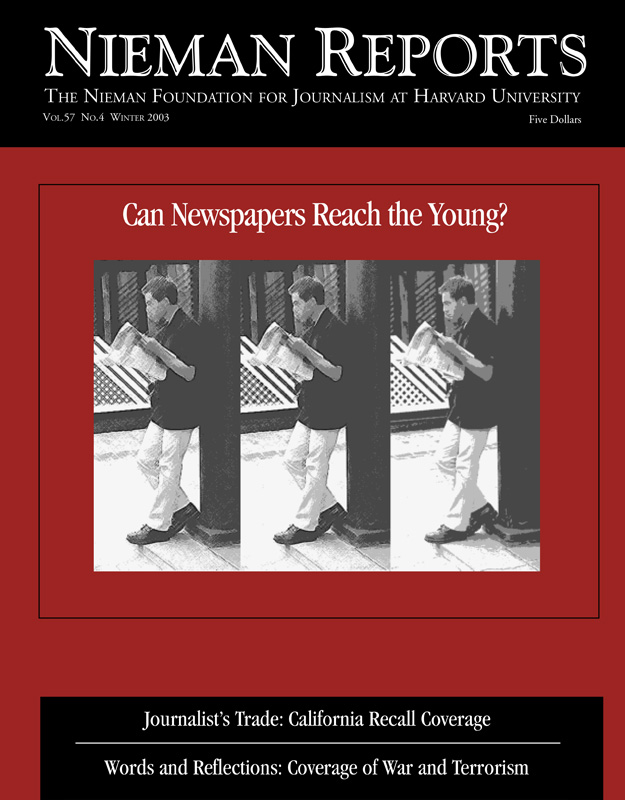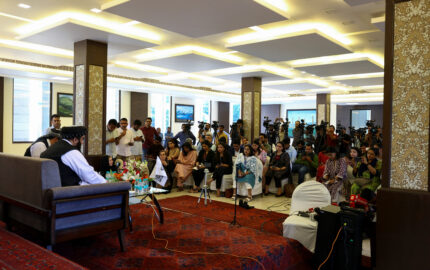As the Unites States’s military engagement continues in Iraq, dissent at home increases and news organizations wrestle with how to report on it, writes former CBS and NBC News correspondent, Marvin Kalb, now a senior fellow at the Shorenstein Center on the Press, Politics and Public Policy at Harvard University. “The White House is determined to control the message,” he observes, “which means it must try to exercise more control over the messengers—a strategic goal that has been tested by many other administrations with results that have always left much to be desired.” An excerpt about the press and its coverage of dissent from a recent book Kalb coedited called “The Media and the War on Terrorism” accompanies his article. And from another book, “Terrorism, War, and the Press,” a collection of papers written by visiting fellows at the Joan Shorenstein Center, comes an excerpt from a 2003 paper by former Los Angeles Times’s Washington Bureau Chief Jack Nelson. In “U.S. Government Secrecy and the Current Crackdown on Leaks,” Nelson writes about a dialogue taking place among some of Washington’s top journalists and government senior intelligence officials “about the issue of protecting government secrets without infringing on the right to report on government.”
In her job as a National Public Radio correspondent, Anne Garrels was one of the few American correspondents to remain in Baghdad and report to her radio audience as the Iraq War was being waged. Her account of this reporting experience has been published in a book, “Naked in Baghdad: The Iraq War as Seen by NRP’s Correspondent.” We are publishing excerpts from her book, which is written in diary style. In one entry, Garrels wonders about the value of a news organization “maintaining a presence at the cost of not reporting the whole truth,” and describes her reporting mission: “I am here to understand how the Iraqis see themselves, their government, and the world around them.”
To publish an oral history of journalists’ wartime reporting, “Embedded: The Media at War in Iraq: An Oral History,” coeditors Bill Katovsky and Timothy Carlson sought out those who had covered the Iraq War and recorded their remembrances. As Katovsky writes about these interviews, “war correspondents spoke frankly—and subjectively—about their experiences.” In an accompanying excerpt from “Embedded,” New York Times’s chief foreign correspondent, John Burns, describes not only what it was like to report in Iraq during the war, but also during the difficult months preceding it. “Editors of great newspapers and small newspapers and editors of great television networks should exact from their correspondents the obligation for telling the truth about these places. It’s not impossible to tell the truth,” Burns observes. “I have a conviction about closed societies, that they’re actually much easier to report on than they seem, because every act of closure is itself revealing. Every lie tells you a truth.”
In his book, “Embedded: Weapons of Mass Deception: How the Media Failed to Cover the War on Iraq,” Mediachannel.org founder Danny Schechter writes a posthumous letter to former CBS news correspondent Edward R. Murrow, ruminating on what happened to the reportorial courage he personified in his coverage of Senator Joe McCarthy’s hearings during the early 1950’s. “Some things don’t change,” Schechter notes in his letter. “Media institutions remain citadels of conformity, conservatism and compromise. Courage is in short supply in our unbrave world of news because it is rarely encouraged or rewarded, especially if and when you deviate from the script.”
Pulitizer Prize-winning photographer David Turnley spent time before and during the Iraq War working in the Gulf region for CNN as a correspondent, contributing to that network’s coverage a mix of video, photography and on-air reporting. He worked in Syria, Turkey and then in Iraq, transmitting his work daily to CNN in Atlanta. In a book, “Baghdad Blues: A War Diary,” Turnley weaves words and images together “to convey the immensely human story of life during the war in Iraq.” Photographs and an excerpt from his book appear on our pages.
For 25 years, Margie Reedy has been a television anchor and reporter, most recently as the host of New England Cable News’s “NewsNight,” a news interview program. Early this year, as the Iraq War began, Reedy was a fellow at Harvard’s Shorenstein Center, working on a documentary film about cable news. How major cable news organizations covered the war became her focus. Reedy’s documentary tracks the approaches various cable networks took to their coverage and includes interviews with media observers about what implications there might be because of coverage decisions made during the war. Reedy notes that “there are profound implications for American television news if opinion—unidentified as such and masquerading as news—becomes the new paradigm for cable news or even the broadcast networks.”
In “War Stories: Reporting in the Time of Conflict From Crimea to Iraq,” Harold Evans, former editor of The Sunday Times in London and former editorial director of the New York Daily News, U.S. News & World Report, and The Atlantic Monthly, explores the dangers and responsibilities that war correspondents assume and shows what about the job has changed and what has stayed the same through time. He also addresses some difficult questions about journalism and war: “Should a correspondent or the editor ever put truth second to his own country’s perceived national interests? What does history have to tell us about the consequences of evading the censor? … What public benefit is there—if any—in the firsthand picture of conflict, or does it amount to no more than voyeurism?”
This fall the Committee to Protect Journalists (CPJ) published an updated version of its guidebook to reporting on war and in other situations in which journalists’ lives might be threatened. Entitled “On Assignment: A Guide to Reporting in Dangerous Situations,” the information delves into a range of possible situations in which journalists find they need to report. Advice includes the warning that “journalists covering conflicts should never carry arms or travel with other journalists who carry weapons,” since doing so “jeopardizes a journalist’s status as a neutral observer and can make combatants view correspondents as legitimate military targets.” But as the CPJ guide points out, this advice comes at a time when some journalists are hiring armed guards to accompany them into dangerous territories.
In her job as a National Public Radio correspondent, Anne Garrels was one of the few American correspondents to remain in Baghdad and report to her radio audience as the Iraq War was being waged. Her account of this reporting experience has been published in a book, “Naked in Baghdad: The Iraq War as Seen by NRP’s Correspondent.” We are publishing excerpts from her book, which is written in diary style. In one entry, Garrels wonders about the value of a news organization “maintaining a presence at the cost of not reporting the whole truth,” and describes her reporting mission: “I am here to understand how the Iraqis see themselves, their government, and the world around them.”
To publish an oral history of journalists’ wartime reporting, “Embedded: The Media at War in Iraq: An Oral History,” coeditors Bill Katovsky and Timothy Carlson sought out those who had covered the Iraq War and recorded their remembrances. As Katovsky writes about these interviews, “war correspondents spoke frankly—and subjectively—about their experiences.” In an accompanying excerpt from “Embedded,” New York Times’s chief foreign correspondent, John Burns, describes not only what it was like to report in Iraq during the war, but also during the difficult months preceding it. “Editors of great newspapers and small newspapers and editors of great television networks should exact from their correspondents the obligation for telling the truth about these places. It’s not impossible to tell the truth,” Burns observes. “I have a conviction about closed societies, that they’re actually much easier to report on than they seem, because every act of closure is itself revealing. Every lie tells you a truth.”
In his book, “Embedded: Weapons of Mass Deception: How the Media Failed to Cover the War on Iraq,” Mediachannel.org founder Danny Schechter writes a posthumous letter to former CBS news correspondent Edward R. Murrow, ruminating on what happened to the reportorial courage he personified in his coverage of Senator Joe McCarthy’s hearings during the early 1950’s. “Some things don’t change,” Schechter notes in his letter. “Media institutions remain citadels of conformity, conservatism and compromise. Courage is in short supply in our unbrave world of news because it is rarely encouraged or rewarded, especially if and when you deviate from the script.”
Pulitizer Prize-winning photographer David Turnley spent time before and during the Iraq War working in the Gulf region for CNN as a correspondent, contributing to that network’s coverage a mix of video, photography and on-air reporting. He worked in Syria, Turkey and then in Iraq, transmitting his work daily to CNN in Atlanta. In a book, “Baghdad Blues: A War Diary,” Turnley weaves words and images together “to convey the immensely human story of life during the war in Iraq.” Photographs and an excerpt from his book appear on our pages.
For 25 years, Margie Reedy has been a television anchor and reporter, most recently as the host of New England Cable News’s “NewsNight,” a news interview program. Early this year, as the Iraq War began, Reedy was a fellow at Harvard’s Shorenstein Center, working on a documentary film about cable news. How major cable news organizations covered the war became her focus. Reedy’s documentary tracks the approaches various cable networks took to their coverage and includes interviews with media observers about what implications there might be because of coverage decisions made during the war. Reedy notes that “there are profound implications for American television news if opinion—unidentified as such and masquerading as news—becomes the new paradigm for cable news or even the broadcast networks.”
In “War Stories: Reporting in the Time of Conflict From Crimea to Iraq,” Harold Evans, former editor of The Sunday Times in London and former editorial director of the New York Daily News, U.S. News & World Report, and The Atlantic Monthly, explores the dangers and responsibilities that war correspondents assume and shows what about the job has changed and what has stayed the same through time. He also addresses some difficult questions about journalism and war: “Should a correspondent or the editor ever put truth second to his own country’s perceived national interests? What does history have to tell us about the consequences of evading the censor? … What public benefit is there—if any—in the firsthand picture of conflict, or does it amount to no more than voyeurism?”
This fall the Committee to Protect Journalists (CPJ) published an updated version of its guidebook to reporting on war and in other situations in which journalists’ lives might be threatened. Entitled “On Assignment: A Guide to Reporting in Dangerous Situations,” the information delves into a range of possible situations in which journalists find they need to report. Advice includes the warning that “journalists covering conflicts should never carry arms or travel with other journalists who carry weapons,” since doing so “jeopardizes a journalist’s status as a neutral observer and can make combatants view correspondents as legitimate military targets.” But as the CPJ guide points out, this advice comes at a time when some journalists are hiring armed guards to accompany them into dangerous territories.



